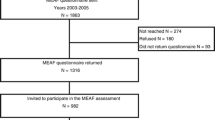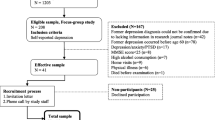Abstract
Purpose
Many young people with psychological problems do not seek help. Recognition of problems and knowledge of appropriate sources of help may increase the likelihood of help seeking. This study aimed to explore whether young adults recognised depressive symptoms in a vignette, and how they thought a young person might respond to these symptoms.
Methods
A postal survey was sent to 3,004 young people aged 16–24 in SW England. The survey included a two-part vignette; the first part depicted mild depressive symptoms, and the second part depicted severe depressive symptoms. Open-ended questions exploring symptom recognition and illness behaviour were answered by 1,125 respondents.
Results
Severe depressive symptoms were recognised by 61.4% of respondents. Young men, particularly those from deprived backgrounds were less likely than women to recognise a mental health problem. Men were also less likely to suggest seeing a doctor than women. 64.7% of the respondents who recognised a mental health problem suggested seeing a doctor, however, only 16.4% thought a severely depressed person actually would see a doctor.
Conclusions
Whilst the majority of young people recognised symptoms of severe depression, the gap between perceived options for help and proposed help seeking behaviour is clinically relevant. The sociodemographic groups at greatest risk of suicide are the least likely to recognise depression, highlighting a need to develop interventions targeting men, particularly those from deprived backgrounds.
Similar content being viewed by others
References
Biddle L, Gunnell D, Sharp D, Donovan JL (2004) Factors influencing help seeking in mentally distressed young adults: a cross-sectional survey. Br J Gen Pract 54:248–253
Oliver MI, Pearson N, Coe N, Gunnell D (2005) Help-seeking behaviour in men and women with common mental health problems: cross-sectional study. Br J Psychiatry 186:297–301
Bebbington PE, Meltzer H, Brugha TS, Farrell M, Jenkins R, Ceresa C, Lewis G (2000) Unequal access and unmet need: neurotic disorders and the use of primary care services. Psychol Med 30:1359–1367
Möller-Leimkühler AM (2002) Barriers to help-seeking by men: a review of sociocultural and clinical literature with particular reference to depression. J Affect Disord 71:1–9
Vanheusden K, van der Ende J, Mulder CL, van Lenthe FJ, Verhulst FC, Mackenbach JP (2009) Beliefs about mental health problems and help-seeking behavior in Dutch young adults. Soc Psychiatry Psychiatr Epidemiol 44:239–246
Vanheusden K, van der Ende J, Mulder CL, van Lenthe FJ, Verhulst FC, Mackenbach JP (2008) The use of mental health services among young adults with emotional and behavioural problems: equal use for equal needs? Soc Psychiatry Psychiatr Epidemiol 43:808–815
Jorm AF, Korten AE, Jacomb PA, Christensen H, Rodgers B, Pollitt P (1997) “Mental health literacy”: a survey of the public’s ability to recognise mental disorders and their beliefs about the effectiveness of treatment. Med J Aust 166:182–186
Wright A, Jorm AF, Harris MG, McGorry PD (2007) What’s in a name? Is accurate recognition and labelling of mental disorders by young people associated with better help-seeking and treatment preferences? Soc Psychiatry Psychiatr Epidemiol 42:244–250
Farrer L, Leach L, Griffiths KM, Christensen H, Jorm AF (2008) Age differences in mental health literacy. BMC Public Health 8:125
Burns JR, Rapee RM (2006) Adolescent mental health literacy: young people’s knowledge of depression and help seeking. J Adolesc 29:225–239
Cotton SM, Wright A, Harris MG, Jorm AF, McGorry PD (2006) Influence of gender on mental health literacy in young Australians. Aust N Z J Psychiatry 40:790–796
Barney LJ, Griffiths KM, Jorm AF, Christensen H (2006) Stigma about depression and its impact on help-seeking intentions. Aust N Z J Psychiatry 40:51–54
Jorm AF, Medway J, Christensen H, Korten AE, Jacomb PA, Rodgers B (2000) Public beliefs about the helpfulness of interventions for depression: effects on actions taken when experiencing anxiety and depression symptoms. Aust N Z J Psychiatry 34:619–626
O’Cathain A, Thomas KJ (2004) “Any other comments?” Open questions on questionnaires—a bane or a bonus to research? BMC Med Res Methodol 4:25
Townsend P, Phillimore P, Beattie A (1988) Health and deprivation: inequality and the North. Croom Helm, London
Office of National Statistics (2000) Standard occupational classification (volumes 1 and 2). The Stationery Office, London
Goldberg D, Williams P (1988) A user’s guide to the general health questionnaire. NFER-Nelson, Windsor, pp 1–129
Hawton K, Houston K, Shepperd R (1999) Suicide in young people. Study of 174 cases, aged under 25 years, based on coroners’ and medical records. Br J Psychiatry 175:271–276
Vanheusden K, Mulder CL, van der EJ, van Lenthe FJ, Mackenbach JP, Verhulst FC (2008) Young adults face major barriers to seeking help from mental health services. Patient Educ Couns 73:97–104
Meltzer H, Bebbington P, Brugha T, Farrell M, Jenkins R, Lewis G (2003) The reluctance to seek treatment for neurotic disorders (Reprinted from Journal of Mental Health, vol 9, pages 319–327, 2000). Int Rev Psychiatry 15:123–128
Riedel-Heller SG, Matschinger H, Angermeyer MC (2005) Mental disorders-who and what might help? Help-seeking and treatment preferences of the lay public. Soc Psychiatry Psychiatr Epidemiol 40:167–174
Kelly CM, Jorm AF, Wright A (2007) Improving mental health literacy as a strategy to facilitate early intervention for mental disorders. Med J Aust 187:S26–S30
Sherwood C (2007) Help-seeking for depression: the role of beliefs attitudes and mood. Behav Cogn Psychother 35:541–554
Lauber C, Nordt C, Falcato L, Rossler W (2001) Lay recommendations on how to treat mental disorders. Soc Psychiatry Psychiatr Epidemiol 36:553–556
Biddle L, Donovan J, Sharp D, Gunnell D (2007) Explaining non-help-seeking amongst young adults with mental distress: a dynamic interpretive model of illness behaviour. Sociol Health Illn 29:983–1002
Angermeyer MC, Matschinger H, Riedel-Heller SG (2001) What to do about mental disorder—help-seeking recommendations of the lay public. Acta Psychiatr Scand 103:220–225
Patel V, Flisher AJ, Hetrick S, McGorry P (2007) Mental health of young people: a global public-health challenge. Lancet 369:1302–1313
Sharp W, Hargrove DS, Johnson L, Deal WP (2006) Mental health education: an evaluation of a classroom based strategy to modify help seeking for mental health problems. J Coll Stud Dev 47:419–438
Acknowledgments
We would like to acknowledge Professor Debbie Sharp (Department of Primary Care, University of Bristol) for contributing towards the design of the study. We would also like to thank the young people who participated in this research. David Gunnell and Jenny Donovan are NIHR senior investigators. This research was funded by NHS South West region. The funder had no further role in study design, data collection, analysis, and interpretation of the data, or writing this paper.
Conflict of interest statement
The authors declare that they have no conflict of interest.
Author information
Authors and Affiliations
Corresponding author
Rights and permissions
About this article
Cite this article
Klineberg, E., Biddle, L., Donovan, J. et al. Symptom recognition and help seeking for depression in young adults: a vignette study. Soc Psychiatry Psychiatr Epidemiol 46, 495–505 (2011). https://doi.org/10.1007/s00127-010-0214-2
Received:
Accepted:
Published:
Issue Date:
DOI: https://doi.org/10.1007/s00127-010-0214-2




